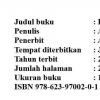Brazil’s “Middle Power” Military Agenda seek its way to Global Context
Lilik Prasaja (09/288727/SP/23761)
Abstract
For last decade we are mostly hear about Brazil’s hard worked in economic development. Through these years Brazil could become one of largest emerging economics of the world. Although the real existence of BRICS (Brazil-Russia-India-China-South Africa) remains unclear, this association of emerging powers should be put on aware. Brazil come from behind as new democratic and fast-developing state though has lot of problem before it could be fully acknowledged as a “success” country.
The upcoming development trend of Brazil (and the others well developing states) is on the military capacity building. Whether or not Brazil prepared for any confrontation, this trend puts Brazil in the world’s military powers radar. Brazil has already mastered short of military technology, from own researches and technology transfers from more “military-sophisticated” countries. With military companies such as Embraer, Brazil produces world-acclaimed military devices, particularly in aircrafts. Embraer’s military aircrafts widely used by countries that badly need reliable military planes, not very high-tech ones, with rational prices.
Brazil path through military development is always being watched (suspiciously) either by its neighbors or world military superpowers. The question remained how Brazil would bring the military power in international politics arena? Would it make Brazil as the next military superpower? The balancer of the western powers? Or found its own way to project military strength? We will discuss it here with the middle power approach.
Keywords: Brazil, military development, international politics, middle power
South America or preferably called Latin America (with the Middle America and The Caribbean Countries) is a developing region. Coming from long history of European colonialism, the Latin Americas created their own path of development. The modern era of Latin America shows countries that could transform its dependency on natural resources to industrial age would “prevail”. Brazil is one of those countries and now stands as new major emerging power. Rapid growth of industrial performance boosts up Brazil’s economic power. This kind of power has a great share in Brazil’s national power and lifts its position in regional and global arena.
Brazil now could we say is number one in region, and now is stepping toward more global “respect”. Brazil (with other countries such as Germany, India and Japan) “dare” enough to propose as new member of Security Council of the United Nations Organization.[1] Security Council, what are the requirements to join it? What is the source of Brazil’s “confidence” to propose that membership? Of course the main reason is military power, military capacity! From this point it is clear enough to say that Brazil had already become military “gigantic” power. Brazil produces many military devices that well used in many countries.
From my point of view, Brazil military strength would is still developing and seeks its “sufficient state”. Brazil would also always project its growing military strength as political power in the regional and global context. Brazil might have become giant military power in the region. But on global context, Brazil is still “green” enough compared to the western powers, especially the mighty United States. From those conditions I should underline the term of middle power as Brazil’s current trend of military based power struggle.
Though the conception of middle power remains debatable, there are some common perceptions that we could use. Middle power is the terms used to the countries, emerging countries that “not of a great power, but neither is it small or indeed insignificant within the global political economy. They thus both belong to the same ‘grey area’ that makes up the ‘middle’ between the small and the great powers.”[2] Emerging power could be included to middle power and the newly industrializing countries (Selcher: 1981, Cooper: 1997, van der Westhuizen: 1998 or Schoeman: 2000). The middle power position on the global context is on the semi-periphery (Sennes: 1998 and Jordaan: 2003)[3]
The middle power or emerging power tends to compete in ‘first order issues’ such as trade and security.[4] Brazil is also focusing in trade and security according to its economic growth. These two matters are exclusively struggled within international institution such as WTO and the UN. Playing in these two arenas would determine Brazil’s foreign policy for years. Whether Brazil succeeded or failed is likely depends on political leadership or presidency.
The word middle power is a temporal terms, transformational as the country more ambitious in international politics.[5] As the time going, Brazil would seek more and more international influence and respect. But, it seems that Brazil should enjoy its position as middle power longer than expected as it progress to become greater power may found resistance. To develop more Brazil needs market, and the world market is still on recess.
Though the current trends of military building Brazil is ‘naturally’ a peaceful state. It comes from the matured economic development, peaceful approach in region and the absence of nuclear weapons.[6] But the use of negotiation and non-military options also reflects the weaknesses of military powers and strategy in the 21st century.[7] However it is enough to say that Brazil would preserve its peaceful way through next decades. Peaceful way is needed by a middle power country to gain respect from other countries.
Brazil could be called as ‘gigantic nations’ due to its territorial, population and economic terms and had been categorized as emerging power since 2001 (along with other BRIC Countries).[8] Setback to 1993 Brazil with Russia, India, China and the United States had been called ‘monster countries’, but Brazil is scared nobody with its soft power approaches.[9] Brazil though has greatest military spending in region but has no intention to become a military power. “Instead it sees itself as a peace-loving, law-abiding and benign power” (Lafer 2001; Ministério da Defesa (Ministry of Defense), 2008).[10]
Brazil’s official statement itself shows the unlikeness to become a military superpower. In contrary, Brazil would become peaceful state and neither promotes hegemony and domination:
Brazil is a peaceful country, by tradition and conviction. It lives in peace with its neighbors. It runs its international affairs, among other things, adopting the constitutional principles of non-intervention, defense of peace and peaceful resolution of conflicts. This pacifist trait is part of the national identity, and a value that should be preserved by the Brazilian people.
Brazil – a developing country – shall rise to the first stage in the world neither promoting hegemony nor domination. The Brazilian people are not willing to exert their power on other nations. They want Brazil to grow without reigning upon others.[11]
It is clear that Brazil is not a ‘threat’ in military perspective. But Brazil’s military power is limitedly seems to strengthen its soft powers and influences in the global context.
The middle power itself remains a model that Brazil would have been fit for Brazil’s profile. Middle power does not rely on military action though it has a superb military capability. Brazil in the 21st century remains ‘calm’ by avoiding military actions or intervention in the regional and global context. Brazil’s military policy relies on forming cooperation and humanitarian matters. This is the result of soft power approach that Brazil had already taken.
Brazil projection for middle power had laid its first step in the region. Brazil had focused in the regionalism building for years. However Brazil failed to gain significant influence and supports from neighboring countries. Brazil laid in ‘conflicting’ condition with other Latin America countries such as Mexico and Argentina. This condition is a setback to Brazil’s foreign policy, neglecting regional and steps toward global arena.[12] Brazil is a great power in the region but not a regional superpower due the lack of leadership and influence towards the region.
From explanations above we could highlight some lines. First, Brazil is an emerging power and considered as world’s next economic giant. Brazil along with Russia, India, China and South Africa are called BRICS, the group of emerging economic powers. Second, Brazil has a great military capability with its own production. Brazil military-industrial complex is becoming a new alternative for other countries that seek non-high tech military equipment with reasonable prices. Third, Brazil is unlikely to project its military strength due to soft power approaches. Official statement and the fact show Brazil’s unlikeness to use force in international matters. Fourth, Brazil failed to gain significant regional influence and supports. Though has great power, Brazil had been found resistances from other Latin America countries.
The conclusion of this paper is Brazil would become a great power, both in economy and military, but would continue its peaceful intents. Though we are cleared enough to say Brazil would be peaceful, the international context would say otherwise. The current hegemonic state would have been suspicious as Brazil developing its military. But again we said Brazil’s military purposes seem only to gain more influence and respect. It is a wasted ‘invests’ if Brazil become military-interventionist like United States.
Sources:
Bertonha, J.F., Brazil: an emerging military power? The problem of the use of force in Brazilian international relations in the 21st century, Journal Rev. Bras. Polít. Int. 53 (2): 107-124 [2010]
Huelsz, C. (Thesis) Middle Power Theories and Emerging Powers in International Political Economy: A Case Study of Brazil, University of Manchester, 2009
Malamud, A., ‘A Leader Without Followers? The Growing Divergence Between the Regional and Global Performance of Brazilian Foreign Policy’, Latin America Politics and Society, Vol 53, Issues 3, Fall 2011 (1-23)
BBC, UN debates new Security Council, accessed on June 1sthttp://news.bbc.co.uk/2/hi/americas/4673977.stm
Official paper of the Brazil Ministry of Defense, National Strategies of Defense, 2008, page 8. Downloaded May 7th on http://www.defesa.gov.br/projetosweb/estrategia/arquivos/estrategia_defesa_nacional_ingles.pdf
[1] BBC, UN debates new Security Council, accessed on June 1sthttp://news.bbc.co.uk/2/hi/americas/4673977.stm
[2] Cornelia Huelsz, (Thesis) Middle Power Theories and Emerging Powers in International Political Economy: A Case Study of Brazil, University of Manchester, 2009, page 14.
[3] Cornelia Huelsz, page 14.
[4] Cornelia Huelsz, page 224.
[5] McFarlane (2004:43) in Cornelia Huelsz, page 230.
[6] João Fábio Bertonha, Brazil: an emerging military power? The problem of the use of force in Brazilian international relations in the 21st century, Journal Rev. Bras. Polít. Int. 53 (2): 107-124 [2010], page 108-109.
[7] Alsina Jr. on João Fábio Bertonha, page 111.
[8] Andrés Malamud, ‘A Leader Without Followers? The Growing Divergence Between the Regional and Global Performance of Brazilian Foreign Policy’, Latin America Politics and Society, Vol 53, Issues 3, Fall 2011 (1-23), page 4.
[9] Kennan (1993), Sotero and Amijo (2007) on Andrés Malamud, page 4.











